- Home
- Clarice Lispector
The Passion According to GH
The Passion According to GH Read online
The Passion According to G.H.
Clarice Lispector
Translation by
Ronald W. SOUSA
Originally published as A paixao sequndo G.H., copyright © 1964 by Clarice Lispector and Heirs of Clarice Lispector. Copyright © 1988 by the University of Minnesota
To Potential Readers:
This is a book just like any other book. But I would
be happy if it were read only by people whose outlook is
fully formed. People who know that an approach—to
anything whatsoever—must be carried out gradually
and laboriously, that it must traverse even the very
opposite of what is being approached. They and they
alone will, slowly, come to understand that this book
exacts nothing of anyone. Over time, the character G. H.
came to give me, for example, a very difficult
pleasure; but it is called pleasure.
C. L.
A complete life may be one ending in so full identification with the non-self that there is no self to die.
Bernard Berenson
Once Within A Room
Ronald W. Sousa
When a woman known to us simply as G. H. enters a room that "nominally" belongs to her, she experiences the frustrations of many of the expectations normally associated with a room. This room seemingly refuses to play the role of a static container, takes on a living force of its own, and virtually comes to impose itself upon its "owner." As the room expands and contracts, G. H.'s identity is continually undone and remade through the progress of her narration.
As this scenario suggests, the story of G. H. does not fulfill the expectations we commonly bring to a narrative. In effect, it breaks down several of our "containers" or categories that serve to render the world comprehensible.
The most important of those containers, as far as the translator and the reader of The Passion According to G. H. are concerned, are those touching on literary concerns. The fact that the Ukraine-born Clarice Lispector (1924-1977) became a literary cause-célèbre in her adopted Brazil but is viewed in France, because of the very same texts, as an important contemporary philosopher dealing with the relationships between language and human (especially female) subjecthood says much about the genre problematic. Are we to take G.H.'s story as fiction or as speculation on philosophical problems in and through the narration of what we would traditionally call a "plot"? Where does literature end and philosophy begin? Intellectually speaking, that question is an easy one to answer: they both end in "language," which for Lispector is the medium within which such designations as "literature" and "philosophy" are made, as well as the medium in and through which alone anything nonlinguistic can be reached. The problem is that for her language is also fallacious unless it is pushed to its limits and thereby made to reveal what, in its structuring as a container, it seeks to hide.
Because of that exploration of language, The Passion According to G. H. comprises a series of nontraditional language usages. It is constituted by segments somewhat but not wholly linearly arranged. They are in fact repetitive, with additions and deletions in each new installment—with, then, both movement and return; and with every successive movement comes reelaboration of already established issues in radically different ways. The text also comprises: inconsistencies in punctuation practice; juxtaposition of colloquial phrases, poetic phrases, and phrases that are completely non-Portuguese; creation of fictitious allusions; reuse of apparently important terms with slightly changed signification, seemingly to avoid creation of consistent terminology; wholesale, but not therefore meaningless, violations of traditional grammar and syntax, and of the concepts of association and exclusion that underlie them; and employment of complex verbal-conceptual ambiguities. A prominent example of the last of those practices is to be seen in the word "passion," which in Portuguese is the colloquial term for "love" and "lover," in addition to its designation of "passion" as an abstraction and of Christ's Passion. Since it is completely undecidable whether the "the" of the book's title should be translated, that title could just as easily be rendered "Love According to G. H." as it could with the formulation I have given it, which emphasizes the Biblical implications also invoked.
As a translator preparing this singular text for a reading public unable to go to the original, I have felt acutely the ways in which traditional expectations have been violated, for such violation has robbed me of useful ways of structuring my presentation. What I have done as a result is to treat the Portuguese original in quite specific ways. (The original used is the second edition, Rio de Janeiro, Editora Sabia Ltda., 1968; although acknowledgment of the fact is nowhere made, it was substantially revised from the copyright-dated first edition, Rio de Janeiro Editora do Autor, 1964.) I have subordinated the rendition of many of what would traditionally be called "literary devices" to delineation, first and foremost, of the intellectual positions set forth in the book, and only thereafter have I endeavored to reproduce such features as style variation and artful use—or violation—of language norms. In so doing, I have often made the translated text more conventional than the original, regularly had to paraphrase where no single term was readily available in English, and occasionally had recourse to philosophical terminology where the original uses more ambiguous, and therefore more powerful, formulations. The result is a text that has lost something of the ambiguity and idiosyncrasy that is part and parcel of the original from which it arises and has become more expository in tone than that original. I invite the reader to imagine a Portuguese text that transmits a much greater sense of potential language chaos than does the translation.
This result may or may not be called "translation," but then that undecidability is only fitting in regard to a work that may or may not be called a "novel."
R. S. 1988
The Passion according to G.H.
I keep looking, looking. Trying to understand. Trying to give what I have gone through to someone else, and I don't know who, but I don't want to be alone with that experience. I don't know what to do with it, I'm terrified of that profound disorganization. I'm not sure I even believe in what happened to me. Did something happen, and did I, because I didn't know how to experience it, end up experiencing something else instead? It's that something that I'd like to call disorganization, and then I'd have the confidence to venture forth because I would know where to come back to: to the prior organization. I prefer to call it disorganization because I don't want to ground myself in what I experienced—in that grounding I would lose the world as it was for me before, and I know that I don't have the capacity for another one.
If I go ahead with that grounding and consider myself true, I'll be lost because I won't know where to set up my new way of being—if I go ahead with my fragmentary visions, the whole world will have to change for me to fit into it.
Something's missing that once was essential to me and is so no longer. I don't need it anymore, as though I had lost a third leg that until then kept me from walking but made me a stable tripod. It's that third leg that's now missing. And I've gone back to being someone I never was. I've gone back to having something I never had before: just my two legs. I know that I can walk only when I have two legs. But I sense the irrelevant loss of the third one, and it horrifies me, it was that leg that made me able to find myself, and without even having to look.
Am I disorganized because I have lost something I didn't even need? In this new cowardice of mine—cowardice is what has happened to me most recently, my greatest adventure, it is so wide a field that only great courage enables me to accept it—in my new cowardice, which is like waking up in the morning in a stranger's house, I do
n't know if I'll have the courage simply to set out. It's hard to lose oneself. So hard that I'll probably soon work out a way of finding myself, even if finding myself is again the lie that I live on. Up to now, finding myself was having a ready-made person-idea and mounting myself inside it: I incarnated myself inside that set-up person and didn't even sense the great construction project that living was. The person-idea that I had came from that third leg of mine, the one that held me fast to the ground. But now . . . will I be freer?
No! I know that I'm still not sensing freely, that once again I'm thinking because my goal is to find—and that for safety's sake I'll call the moment that I come across a way out "finding." Why don't I have the courage to find just a way in? Oh, I know that I have gone in. But I've been afraid because I don't know where that way in leads. And I've never before let myself go without knowing where.
Yesterday, however, I lost my human constitution for hours and hours. If I'm brave, I'll let myself stay lost. But I'm afraid of new things and I'm afraid to experience what I don't understand—I always want the guarantee of at least thinking that I understand, I don't know how to just give myself over to disorientation. How do I explain that my greatest fear is precisely in relation to ... to being? and that there is nonetheless no other way to go. How to explain that my greatest fear is precisely the fear of having to live out whatever happens? how to explain that I cannot bear to look out, only because life is not at all what I thought it was and is in fact something other—as though I had known before what it was! Why is it that just looking is so greatly disorganizing?
And disillusioning too. But what could I become disillusioned about? if I was barely able to stand my merely constructed organization without at least sensing? Maybe disillusionment is the fear of no longer fitting into a system? It could, however, be said that he is very happy who finally experiences disillusionment. What I was before wasn't good for me. But it was from that ungood that I put together something better: I had put together hope. From my own ungood I had created a future good. Am I now afraid that my new outlook won't make sense? But why don't I just let myself be guided by whatever happens? I shall have to run the holy risk of chance. And replace fate with probability.
But are the discoveries of infancy like those made in a laboratory, where one finds what one will? Was it, then, only when I became an adult that I started to fear and grew the third leg? Can I, as an adult, have the childlike courage to lose myself? to lose oneself is to go looking with no sense of what to do with what you might find. The two walking feet minus that extra third one that holds a person down. And I want to be held down. I don't know what to do with the horrifying freedom that can destroy me. But while I was held down, was I happy? Or was there—and there was—an uncanny, restless something in my happy prison routine? Or was there—and there was—that throbbing something to which I was so accustomed that I thought throbbing was the same as being a person? Isn't that it? yes, that too . . . that too ...
I become so scared when I realize that over a period of hours I lost my human constitution. I don't know if I'll have another one to replace the lost one with. I know that I'll need to take care not to surreptitiously use a new third leg that can grow back in me as easily as a weed, and then call that protective leg "a truth."
But I also don't know what form to give to what happened to me. And for me nothing exists unless I give it a form. And . . . and what if the reality is precisely that nothing has existed?! maybe nothing happened to me? I can understand only what happens to me, but only what I understand happens . . . what do I know about the rest? the rest hasn't existed. Maybe nothing has existed! Maybe I have merely undergone a great, slow disintegration. And my struggle against that disintegration is just that: is just trying to give it a form. A form gives contours to chaos, gives a construct to amorphous substance . . . the vision of an infinite flesh is a madman's vision, but if I cut that flesh into pieces and spread those pieces over days and famines . . . then it will no longer be perdition and madness: it will be humanized life again.
Humanized life. I had humanized life too much.
But what shall I do now? Shall I hold onto the whole vision, even though it means holding onto an incomprehensible truth? or shall I give form to nothingness and let that be my way of integrating my very disintegration into myself? But I am so poorly prepared to understand. Before, whenever I tried, my limitations gave me a sensation of physical discomfort, in me, any effort to think immediately runs up against my head. Early on I had to recognize coldly the obstacle that my meager intelligence represented and reject setting out on any path. I knew that it was my fate to think little, reasoning power kept me fast inside my own skin. How, then, could I now start thinking? and maybe only thought could save me, I'm afraid of passion.
Now that I have to save tomorrow, that I have to have a form because I don't sense that I have the strength to stay disorganized, now that, fatefully, I shall have to frame that monstrous, infinite flesh and cut it into pieces that something the size of my mouth can take in, and the size of my eyes' vision, now that I shall fatefully succumb to the necessity of form that comes from my fear of being undelimited—then let me at least have the courage to let that form form by itself, like a crust that hardens on its own, a fiery nebula that cools into earth. And let me have the great courage to resist the temptation to invent a form.
The effort that I shall now make to let a sense, whatever it may be, rise to the surface, that effort could be made easier if I pretended to write for someone.
But I'm afraid to start writing to be understood by that imaginary someone, I'm afraid I'll start "making" a sense, with the same meek madness that up to yesterday was my "healthy" way of fitting into a system. Will I have to have the courage to use an undefended heart and go on speaking to nothing and no one? as when a child thinks about nothingness. And to run the risk of being crushed by chance.
I don't understand what I saw. I don't even know if I saw it, since my eyes ended up not being separate from what I saw. Only in an unexpected rippling of the lines, only in an anomaly in the uninterrupted continuity of my culture, did I for an instant experience life-giving death. That purified death that made me sort through the forbidden weft of life. Saying the name of life is forbidden. And I almost said it. I almost couldn't disentangle myself from its weft, which would have been the destruction of my age inside me.
Perhaps what happened to me is an understanding . . . and for me to be true, I have to continue being separate from it, have to continue not understanding it. All sudden understanding very closely approximates a clear nonunderstanding.
No. All sudden understanding is in the last analysis the revelation of a clear nonunderstanding. Every moment of finding is the losing of oneself. Perhaps I experienced an understanding that was as complete as an ignoring, and I shall emerge from it as intact and innocent as before. Any comprehension on my part will never be equal to that understanding, for I can reach only the height of living— the only level on which I function is the level of living. Only now, now I know of a secret. Which I am already forgetting; oh I feel that I am already forgetting . . .
To rediscover it now I would have to die all over again. And knowing it again could be the murder of my human soul. And I don't want to, I don't want to. What could still save me would be for me to deliver myself over to that new ignorance; that would be possible. For all the while that I am struggling to know, my new ignorance, which is forgetting, has become sacred. I am the priestess of a secret that I no longer know. And I serve out of blissful ignorance. I found out something I was unable to understand, my lips became sealed, and I retained only the incomprehensible fragments of a ritual. Although for the first time I feel that my forgetting is, in the last analysis, of a piece with the world. Oh, and I don't want in the least to have anything explained to me that would have to be made to go beyond itself to be explained. I don't want anything explained to me that would require human validation again for its interpretation.
Life and death have been mine, and I was a monstrosity. Mine was the courage of the sleepwalker who simply acts. During those hours of perdition, I had the courage neither to compose nor to organize. And especially the courage not to look ahead. Up to then I had not been brave enough to let myself be guided by what I don't know toward what I don't know: my foresight preconditioned what I would see. It wasn't the foresight of seeing: it already had my care's dimensions about it. My foresight closed the world to me.
Until, for a few hours, I stopped. And, my God, I got what I didn't want. It wasn't a river valley I walked along—I had always imagined that discovery would be fertile and humid, like river valleys. I never thought it would be the immense disencounter that it was.
Is my sacrifice for continuing to be human just forgetting? I shall now be able to recognize in the common faces of some people that. . . that they have forgotten. And that they no longer know that they have forgotten what they have forgotten.
I saw it. I know I did because I didn't give it its meaning. I know that I did because I don't understand it. I know I did because what I saw isn't good for anything. Listen, I'm going to have to talk because I don't know what to do with that moment of living that I experienced. Worse yet: I don't like what I saw. It explodes my day-to-day life. I apologize for putting this all on you, I would have much preferred seeing something better. Take what I experienced, free me from my useless vision, from my useless sin.
I'm so frightened that I shall be able to accept the notion that I have lost myself only if I imagine that someone is holding my hand.
Putting my hand in someone else's has always been my definition of happiness. Before I fall asleep, often—in that small struggle not to lose consciousness and go into the greater world—often, before I get up the courage to go into the vastness of sleep, I pretend that someone has my hand in theirs, and then I go, go to that enormous absence of form that is sleep. And when even after that I don't have courage, I dream.

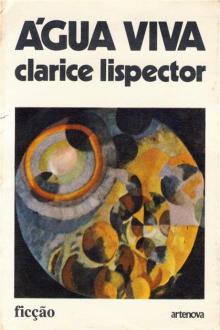 The Stream of Life
The Stream of Life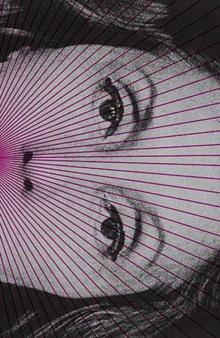 The Complete Stories
The Complete Stories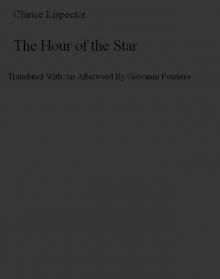 The Hour of the Star
The Hour of the Star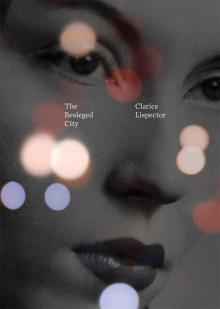 The Besieged City
The Besieged City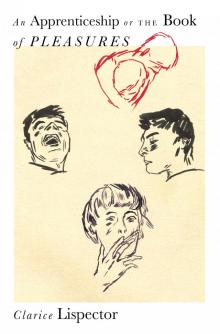 An Apprenticeship or the Book of Pleasures
An Apprenticeship or the Book of Pleasures The Chandelier
The Chandelier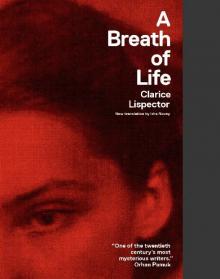 A Breath of Life
A Breath of Life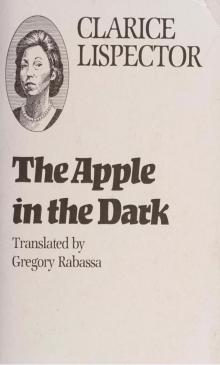 The Apple in the Dark
The Apple in the Dark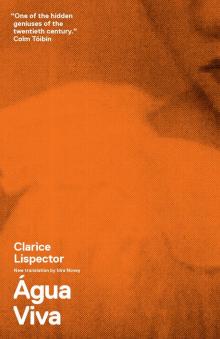 Agua Viva
Agua Viva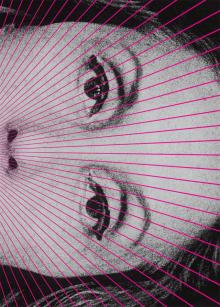 Complete Stories
Complete Stories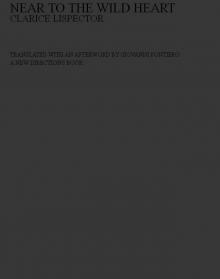 Near to the Wild Heart
Near to the Wild Heart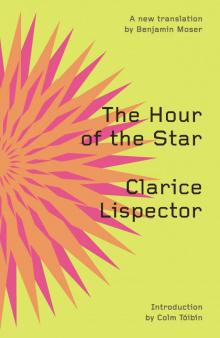 The Hour of the Star ()
The Hour of the Star ()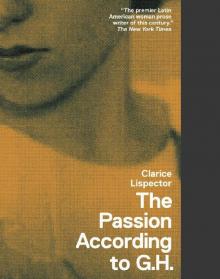 The Passion According to G.H.
The Passion According to G.H.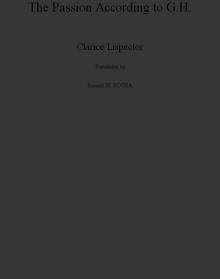 The Passion According to GH
The Passion According to GH